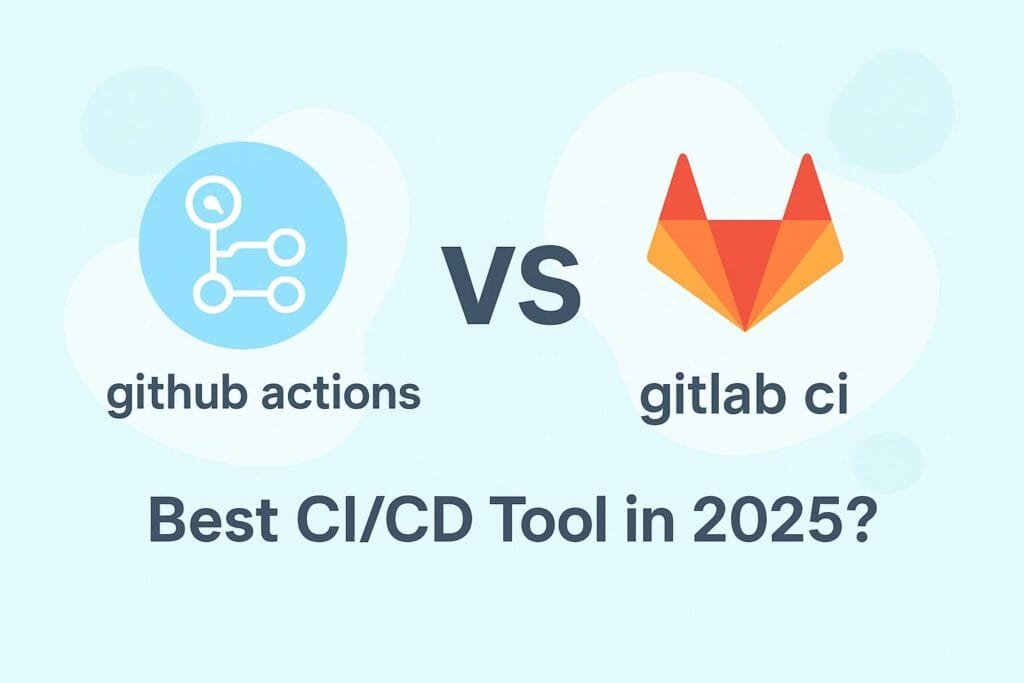When it comes to modern software development, Continuous Integration and Continuous Deployment (CI/CD) tools have become essential. Developers across the globe are looking for the best CI/CD solution to streamline their workflows, automate testing, and deploy applications seamlessly. In 2025, two of the most popular tools competing head-to-head are GitHub Actions and GitLab CI. Both tools offer powerful automation capabilities, but which one should you choose for your project?

In this article, we will compare GitHub Actions vs GitLab CI in detail, including their features, pricing, integrations, performance, and developer experience. By the end, you’ll be able to make an informed decision about the right CI/CD tool for your team in 2025.
What is GitHub Actions?
GitHub Actions is GitHub’s native automation and CI/CD tool that allows developers to build, test, and deploy their code directly from their repositories. With YAML-based configuration files, you can define workflows triggered by specific events such as pushes, pull requests, or releases. GitHub Actions has become increasingly popular due to its deep integration with GitHub repositories, massive marketplace of prebuilt actions, and support for multi-platform builds.
What is GitLab CI?
GitLab CI/CD is a built-in feature of GitLab, a complete DevOps platform. GitLab CI offers pipelines as code, defined in .gitlab-ci.yml files, and provides everything from version control to issue tracking, container registry, and deployment solutions in a single platform. GitLab CI is widely appreciated for its flexibility, scalability, and ability to manage entire DevOps lifecycles under one roof.
Comparison: GitHub Actions vs GitLab CI (2025)
Below is a side-by-side comparison of the two CI/CD tools:
| Criteria | GitHub Actions | GitLab CI |
|---|---|---|
| Integration | Tightly integrated with GitHub repositories | Part of GitLab DevOps ecosystem |
| Ease of Use | User-friendly with a large marketplace of reusable workflows | Requires initial setup but highly customizable |
| Configuration | YAML-based workflows (.github/workflows/) | YAML-based pipelines (.gitlab-ci.yml) |
| Pricing | Free tier with limited minutes, paid tiers for extra runners | Free tier with 400 CI/CD minutes, premium tiers offer more |
| Runner Options | GitHub-hosted or self-hosted runners | Shared runners or self-hosted runners |
| Best For | Teams already using GitHub repositories | Teams needing a full DevOps platform |
Pros and Cons
GitHub Actions Pros
- Seamless integration with GitHub repositories
- Large action marketplace for prebuilt workflows
- Supports matrix builds across OS and language versions
- Great for open-source projects
GitHub Actions Cons
- Limited free minutes compared to competitors
- Vendor lock-in with GitHub
- Not as feature-rich for full DevOps lifecycle
GitLab CI Pros
- End-to-end DevOps platform (issues, repos, CI/CD, registry)
- Strong security and compliance features
- Flexible with both SaaS and self-hosted options
- Better suited for enterprises with complex pipelines
GitLab CI Cons
- Learning curve can be steep
- UI not as lightweight as GitHub
- Some features locked behind paid tiers
Performance in 2025
As of 2025, both GitHub Actions and GitLab CI have improved significantly in performance and stability. GitHub has enhanced its runner infrastructure, while GitLab continues to expand enterprise-grade scalability. If your project emphasizes speed and developer experience, GitHub Actions is often the easier choice. However, if your organization requires compliance, governance, and integration across the full DevOps lifecycle, GitLab CI remains the stronger option.
Community and Ecosystem
GitHub Actions benefits from the massive developer community on GitHub, where millions of workflows are shared. GitLab CI, on the other hand, has a loyal enterprise and open-source community that values its all-in-one platform approach. Both ecosystems are thriving, but GitHub’s marketplace makes it easier for developers to plug and play.
Which One Should You Choose?
The choice between GitHub Actions vs GitLab CI depends on your specific needs:
- If you want simplicity, fast adoption, and already use GitHub repositories, go with GitHub Actions.
- If you want an all-in-one DevOps solution with enterprise scalability, GitLab CI is the better option.
Conclusion
In 2025, both GitHub Actions and GitLab CI stand as top-tier CI/CD tools. The right tool for you depends on your workflow, budget, and project requirements. GitHub Actions shines in ease of use and community support, while GitLab CI excels in enterprise readiness and comprehensive DevOps capabilities.
To learn more about DevOps practices and CI/CD trends, check out DevOps.com for updated industry insights.

